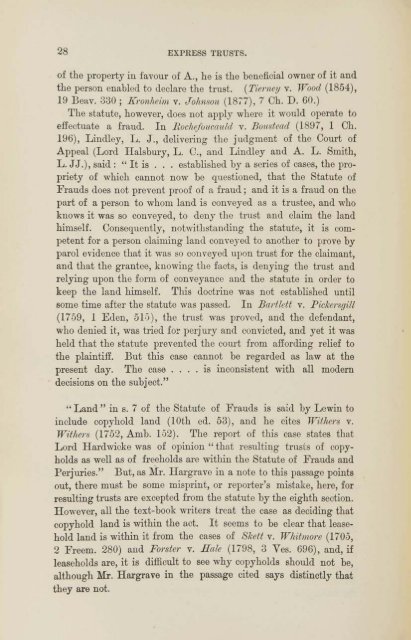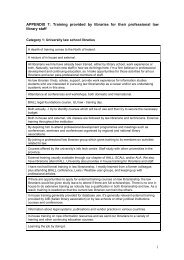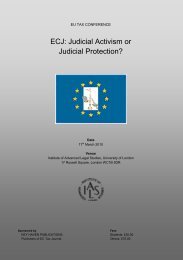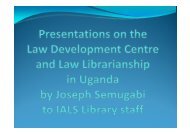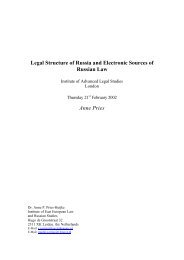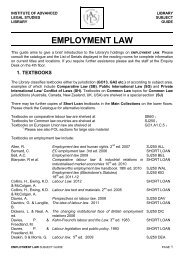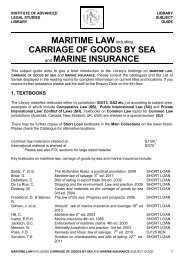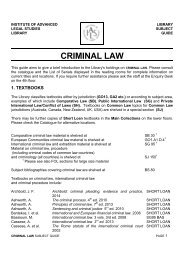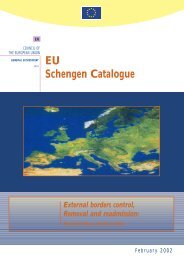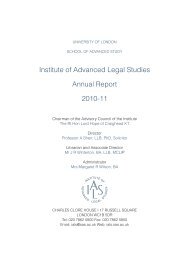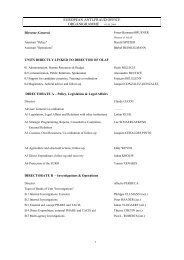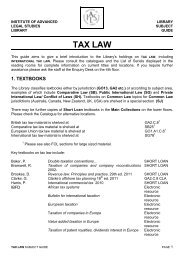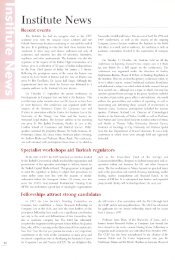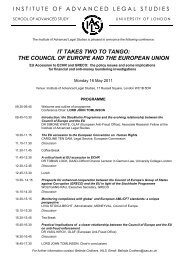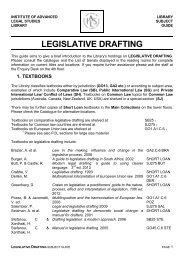a thesis - Institute of Advanced Legal Studies
a thesis - Institute of Advanced Legal Studies
a thesis - Institute of Advanced Legal Studies
Create successful ePaper yourself
Turn your PDF publications into a flip-book with our unique Google optimized e-Paper software.
28 EXPRESS TRUSTS.<br />
<strong>of</strong> the property in favour <strong>of</strong> A., he is the beneficial owner <strong>of</strong> it and<br />
the person enabled to declare the trust. (Tierney v. Wood (1854),<br />
19 Beav. 330 ; Kronheim v. Johnson (1877), 7 Ch. D. 60.)<br />
The statute, however, does not apply where it would operate to<br />
effectuate a fraud. In Rochefoucauld v. Boustead (1897, 1 Ch.<br />
196), Lindley, L. J., delivering the judgment <strong>of</strong> the Court <strong>of</strong><br />
Appeal (Lord Halsbury, L. C., and Lindley and A. L. Smith,<br />
L. JJ.), said :" It is ... established by a series <strong>of</strong> cases, the propriety<br />
<strong>of</strong> which cannot now be questioned, that the Statute <strong>of</strong><br />
Frauds does not prevent pro<strong>of</strong> <strong>of</strong> a fraud; and it is a fraud on the<br />
part <strong>of</strong> a person to whom land is conveyed as a trustee, and who<br />
knows it was so conveyed, to deny the trust and claim the land<br />
himself. Consequently, notwithstanding the statute, it is competent<br />
for a person claiming land conveyed to another to prove by<br />
parol evidence that it was so conveyed upon trust for the claimant,<br />
and that the grantee, knowing the facts, is denying the trust and<br />
relying upon the form <strong>of</strong> conveyance and the statute in order to<br />
keep the land himself. This doctrine was not established until<br />
some time after the statute was passed. In Bartlett v. Pickersgill<br />
(1759, 1 Eden, 515), the trust was proved, and the defendant,<br />
who denied it, was tried for perjury and convicted, and yet it was<br />
held that the statute prevented the court from affording relief to<br />
the plaintiff. But this case cannot be regarded as law at the<br />
present day. The case .... is inconsistent with all modern<br />
decisions on the subject."<br />
"Land" in s. 7 <strong>of</strong> the Statute <strong>of</strong> Frauds is said by Lewin to<br />
include copyhold land (10th ed. 53), and he cites Withers v.<br />
Withers (1752, Amb. 152). The report <strong>of</strong> this case states that<br />
Lord Hardwicke was <strong>of</strong> opinion " that resulting trusts <strong>of</strong> copyholds<br />
as well as <strong>of</strong> freeholds are within the Statute <strong>of</strong> Frauds and<br />
Perjuries." But, as Mr. Hargrave in a note to this passage points<br />
out, there must be some misprint, or reporter's mistake, here, for<br />
resulting trusts are excepted from the statute by the eighth section.<br />
However, all the text-book writers treat the case as deciding that<br />
copyhold land is within the act. It seems to be clear that leasehold<br />
land is within it from the cases <strong>of</strong> Skett v. Whit more (1705,<br />
2 Freem. 280) and Forstcr v. Hale (1798, 3 Ves. 696), and, if<br />
leaseholds are, it is difficult to see why copyholds should not be,<br />
although Mr. Hargrave in the passage cited says distinctly that<br />
they are not.


